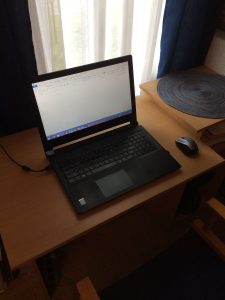“That story wrote itself,” I’ve sometimes said. But I exaggerated; it didn’t really happen that way. Still, it got me thinking. What if a story could write itself?
I decided to find out. Being rather sciency, I reckoned I’d conduct a careful and thorough experiment. I would give a story every conceivable chance, every possible opportunity, to write itself. Not because I’m lazy, you understand. This was for Science.
It’s time to shift the tone of this blog post to scientificalic language, lest you start to suspect I’m some kind of…not scientist.

Ahem…the laptop was positioned in a roo—I mean—laboratory accustomed to having stories written in it, at a temperature of 24° C at normal atmospheric pressure. The laptop was turned on, plugged into a 120-volt alternating current power source, and word processing software was accessed.
The experimenter then left the laboratory and engaged in other, non-writing activities. These included cleaning other rooms, mowing the lawn, reading books, making and consuming lunch, and driving around town on various errands.
After a period of 8 hours and 24 minutes, the experimenter quietly re-entered the laboratory and discovered that a story had not been written. Even a part of a story had not been written, not a paragraph, sentence, word, letter, or punctuation mark. Neither had any new computer files been stored.
To gather more data, further opportunities were presented to the laptop on subsequent days. Longer time periods were tried, durations up to 73 hours and 53 minutes, with the same result. The experimenter engaged in a wider variety of non-writing activities, at greater distances from the laptop. Some trials were conducted with the laboratory door open, and some with it shut. Actual writing occurred in 0% of these cases.
Similar experiments were conducted with ink-filled pens and reams of blank paper. This served to eliminate the laptop and its software as the causal factor. Despite every opportunity and considerable time provided, the pens created no marks on the paper.
The experimenter tried to “spur” or “seed” the process by writing a first sentence, and allowing both laptop and pen to merely complete the story. These attempts likewise resulted in failure.
Numerous graphs were developed to document the results of these trials. They are not included here because the independent variable refused to depart from the axis; that is, the results were 0 in every case. 0 writing produced no matter what other quantity was being tested.
One common factor in all these trials was the experimenter himself. He therefore consulted several other writers and 100% of them reported the same outcomes in their “experiments,” though their trials were far less scientifical, with no white laboratory coats anywhere in evidence, and they had utterly failed to note the temperature. Mention of them here is included as anecdotal evidence only.
The experimenter is therefore forced to a surprising, though tentative, conclusion—it may be possible that stories do not, in fact, write themselves. The creation of stories appears to require the active participation of a writer. Significant participation actually, in every written story so far. At least this seems true for stories involving this single experimenter.
Further research is clearly indicated to validate or (hopefully) disprove this conclusion. Perhaps some necessary initial condition was overlooked, some nuance of temperature, pressure, time duration, or distance. Maybe positive results might occur under certain lunar phases or planetary alignments. A breakthrough may well await some future experimenter in this exciting research field.
For the advancement of Scientificness, this experimenter encourages others to conduct similar trials, particularly those authors writing in the same competitive genres as this experimenter. Feel free to send your own scientilic trial results as comments to this blog post by—
Poseidon’s Scribe
